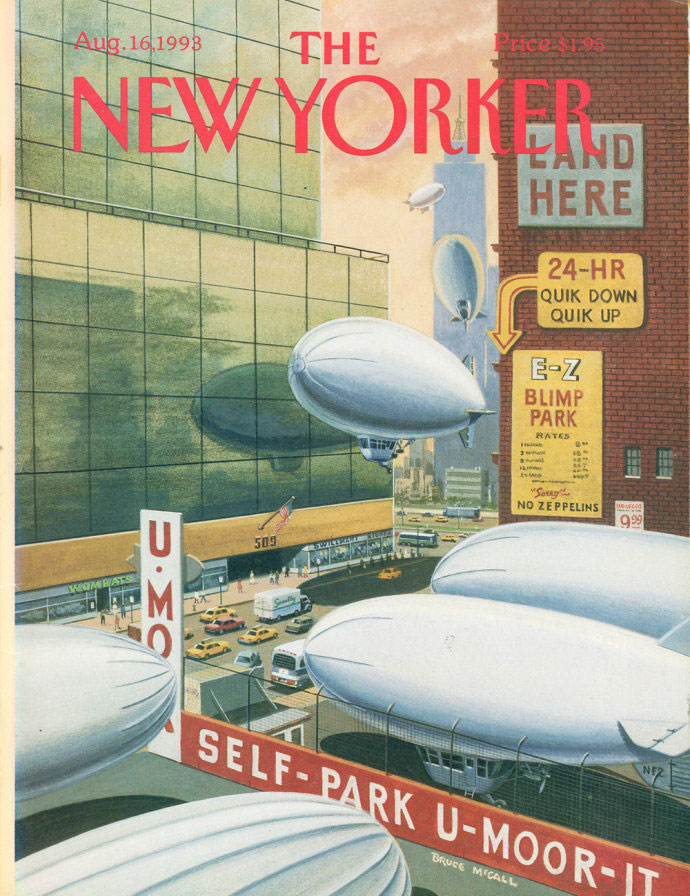

August 16, 1993
Half an hour before William Gibson and his fellow-novelist Steve Erickson began their readings in Central Park, the front center rows of Rumsey Playfield, off East Seventy-second Street, had mostly been staked out by a rabble of computer hackers. They called each other Voxers, for MindVox, which was the computer bulletin board they communicated on. There were about twenty of them. Some had come all the way from Boston, or Atlanta, and few had ever met face-to-face. “We’re not fans,” one of them said. “We’re participants.” The readings were part of a series of free events called SummerStage, and the writers were billed as “fiction visionaries.” Gibson is the father of the technocultural phenomenon called “cyberpunk.” “He is the Aesop of the computer age” is how one Voxer put it.
“Cyberspace” is Gibson’s famous term for the new computer universe. In his books (he’s been writing for over a decade now), cyberspace is a strange, extravagant place. Someone in the front row (not a Voxer) called it “a kind of shared public hallucination.” Gibson did not invent the phrase “virtual reality,” but his novels anticipated the concept. The movie director Oliver Stone borrowed heavily from them to create his addled television miniseries called “Wild Palms.” In Gibson’s “Cyberspace” trilogy, “cowboys” access cyberspace using special skull implants. “They’re like hackers,” the front-row expert explained. “They get in and fly among the data bases.”
Nearly a million copies have been sold of the books in the trilogy “Neuromancer,” “Count Zero,” and “Mona Lisa Overdrive.” Gibson is about to publish another novel, “Virtual Light,” and will be making more appearances in Manhattan later this month. Posters advertising those events make him look goggle-eyed, even fearsome. But in the flesh he looked fresh faced and spindly. He was wearing chinos and a white cotton shirt, and before the readings began he hung around beside the stage, smiling down at people in the audience he is six feet six inches tall. Quirky country tunes and snatches of jazz were played over the P.A. system. Soon the green bleacher seats, set back under the trees, began to fill up. The Voxers, up front, couldn’t stop talking. They drank cans of beer and called each other by strange Voxer names, such as Deckard, Gearhead, and Morphy.
“Gibson’s books are hard and dense; they’re just really packed,” Gearhead, an amiable video engineer from Brooklyn, with a blooming black tattoo on one shoulder, said. The Voxers’ leader, Tomwhore, who had a huge eyeball stenciled on his T-shirt, and an eyeball trinket hanging from his neck, said he and his friends spent a few hours on MindVox each day, “just filling up space with information, not snarfing. Snarfing is not good.” (“Snarfing” is a word that only Voxers, apparently, understand.)
Steve Erickson, who has a mane of graying hair, read first, from his new novel, “Arc d’X.” It was an anarchic piece about Berlin in 1999: the zoo has been torn open, and the city is littered with live and dead animals; a wandering American checks into a shabby hotel, has telephone sex, and is bludgeoned to death by a pack of skinheads.
Gibson read for about twenty-five minutes, from “Virtual Light.” He later described it as a darkly comic urban detective story with social commentary thrown in. “Lime-and-purple diagonals chased themselves across the screen, then faded” was the first line of the reading. Gibson lives in Vancouver, British-Columbia, but he grew up in southwestern Virginia, and still drags his vowels when he talks. When the reading was over, he caught a plane back to Vancouver, to finish a film script. “He’s all sweaty,” a member of his entourage said. “He’s spent.” The Voxers chatted for a while longer, and then Tomwhore, holding a string of orange balloons, led them away toward Lexington Avenue. “We’re all going out for a beer,” he said. “Why don’t you come hang?”






Recent Comments